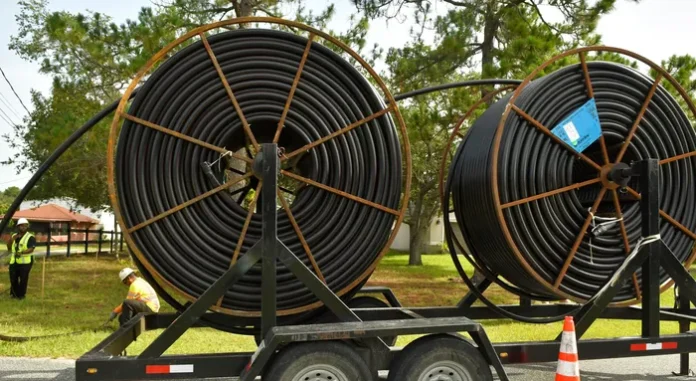The Sarasota City Commission has taken a critical step toward enhancing the resilience of its barrier islands, voting unanimously on October 21 to approve a feasibility study regarding the undergrounding of power and telecom lines on St. Armands and Lido Keys. This action follows significant flooding and extended power outages during last year’s storms.
The 5-0 vote authorizes city staff to delve into the specifics of the project, including potential costs, timelines, legal and regulatory issues, and the impact on residential and commercial property owners. A final decision on whether to proceed with the actual project will only be made after the study is completed.
The initiative has strong backing from local community groups.
The St. Armands Residents Association recently conducted an annual survey in which 87% of all respondents indicated they think the city should proceed. Among those who primarily reside and vote in Sarasota, support was even higher at 93%.
“We think this is an important step in making the city’s barrier islands more resilient,” said St. Armands Residents Association President Goglia, noting that two of the association’s directors spoke in support at the recent commission meeting. “Longboat Key had already buried its utilities and only had minimal issues during last year’s storm surge. It’s safer and faster for utility companies to fix issues because they don’t need bucket trucks.”
The push for enhanced resiliency comes after years of hurricane-related outages and follows the example of the nearby Town of Longboat Key, which recently completed its own extensive project to bury all power lines after nearly a decade, at a cost of approximately $43 million. Property owners there are paying an average of $4,200 in assessments over 30 years.
To fund a potential project in Sarasota, the city is considering creating special taxing districts on Lido and St. Armands Key, which would require property owners to fund the investment through assessments.
Dennis Bischoff, a Lido Shores resident speaking on behalf of his neighborhood, highlighted the urgency for the vulnerable barrier islands. “The key word here is resiliency,” Bischoff said. “Lido Shores, Lido Key, St. Armands are on a fragile barrier island and far more subject to Mother Nature, and to have power lines underground is obvious and should be a priority for the homeowners, businesses, for the City of Sarasota and Florida Power and Light.”
Bischoff pointed out FPL data suggesting underground lines perform up to 14 times better than overhead lines during major storms, reducing repair time and long-term costs. He noted strong support from his community, with 97% of a majority of surveyed households voting in favor.
Carl Shoffstall, President of the Lido Key Residents Association, also voiced support for the project in a letter to the City. The board of the association unanimously agreed to ask the city to proceed with the plan, to be paid for by property owners in the neighborhoods. An email survey of their members showed that 93% of respondents supported the project.
Shoffstall’s letter read, “Our board discussed and reviewed the experiences of other barrier islands that are FPL customers and are optimistic that this project will significantly improve safety, resiliency and aesthetics on Lido, but also recognize that the project must extend through St. Armand’s to have the maximum effect for us.” The survey also provided insight into preferred payment methods, with 59% of respondents favoring an ad valorem tax and 71% opting to spread payments over 20 years.
The commission’s vote authorizes staff to hire a consultant to develop a preliminary cost estimate. Because the project requires coordination with several utilities, staff estimate it could take between four and seven years to complete.
Sarasota’s proposed voluntary effort is separate from Florida Power & Light’s (FPL) statewide Storm Secure Underground Program, which is funded by a surcharge on all customer bills. FPL is currently in the process of undergrounding 10 miles of overhead lines in several existing neighborhoods within the City of Sarasota under that separate program. The utility has also requested a record base rate increase from the state that could add up to an additional $18 per month to customer bills.

